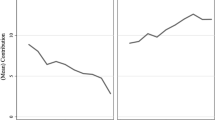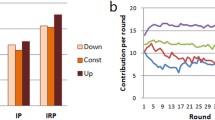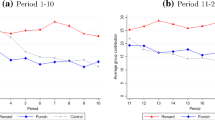Abstract
This paper studies how subjects in a three-person sequential step-level public good game learn to punish free riders more over time. Our current work makes several additions to the literature on other regarding behavior. First, our experiment provides evidence that subjects care about the actions that lead to an outcome as well as the outcome itself, replicating the results of A. Falk, E. Fehr and U. Fischbacher (Economic Inquiry, in press), J. Brandts and C. Solà (Games and Economic Behavior, 36(2), 138–157, 2001.) and J.H. Kagel and K. Wolfe (Working paper, Ohio State University, 1999). Second, our experiment provides one of the first tests of the newer theories of reciprocity by A. Falk and U. Fischbacher (Working paper, University of Zurich, 2000) and G. Charness and M. Rabin (Quarterly Journal of Economics, in press) that take a psychological games approach. We find that these theories fail to explain the experimental data. Finally, we examine the mechanism by which subjects learn to punish free-riding more ofter over time.
Similar content being viewed by others
References
Berg, J., Dickhaut, J.W., and McCabe, K.A. (1995). “Trust, Reciprocity and Social History.” Games and Economic Behavior. 10(1), 122–142.
Bolton, G.E. and Ockenfels A. (2000). “ERC: A Theory of Equity, Reciprocity and Competition.” American Economic Review. 90(1), 166–193.
Brandts, J. and Solí, C. (2001). “Reference Points and Negative Reciprocity in Simple Sequential Games.” Games and Economic Behavior. 36(2), 138–157.
Charness, G. and Rabin M. “Social Preferences: Some Simple Tests and a New Model.” Quarterly Journal of Economics, in press.
Cooper, D.J. and Stockman, C.K. “Fairness and Learning: An Experimental Examination.” Games and Economic Behavior, in press.
Erev, I. and Rapoport, A. (1990). “Provision of Step-Level Public Goods: The Sequential Contribution Mechanism.” Journal of Conflict Resolution. 34(3), 401–425.
Falk, A. and Fischbacher U. (2000). “A Theory of Reciprocity.” Working paper, University of Zurich.
Falk, A., Fehr, E., and Fischbacher, U. “On the Nature of Fair Behavior.” Economic Inquiry, in press.
Fehr, E., Kirchler, E., Weichbold, A., and Gachter, S. (1998a). “When Social Norms Overpower Competition: Gift Exchange in Experimental Labor Markets.” Journal of Labor Economics. 16(2), 324–351.
Fehr, E., Kirchsteiger, G., and Reidl, A. (1998b). “Gift Exchange and Reciprocity in Competitive Experimental Markets.” European Economic Review. 42, 1–34.
Fehr, E. and Schmidt, K.M. (1999). “A Theory of Fairness, Competition, and Cooperation.” Quarterly Journal of Economics. 114, 817–868.
Hoffman, P.J., Festinger, L., and Lawrence, D.H. (1954). “Tendencies Toward Group Comparability in Competitive Bargaining.” Human Relations. 7, 141–160.
Kagel, J.H. and Wolfe, K. (1999). “Testing Between Alternative Models of Fairness: A New Three-Person Ultimatum Game.” Working paper, Ohio State University.
Ledyard, J.O. (1995). “Public Goods: A Survey of Experimental Research.” In J.H. Kagel and A.E. Roth (eds.), The Handbook of Experimental Economics. Princeton: Princeton University Press.
Roth, A.E. (1995). “Bargaining Experiments.” In J.H. Kagel and A.E. Roth (eds.), The Handbook of Experimental Economics. Princeton: Princeton University Press.
Roth, A.E. and Erev, I. (1995). “Learning in Extensive-Form Games: Experimental Data and Simple Dynamic Models in the Intermediate Term.” Games and Economic Behavior. 8(1), 164–212.
Van de Kragt, A.J., Orbell, J.M., and Dawes, R.M. (1983). “The Minimal Contributing Set as a Solution to Public Goods Problems.” American Political Science Review. 77(1), 112–122.
Author information
Authors and Affiliations
Rights and permissions
About this article
Cite this article
Cooper, D.J., Stockman, C.K. Learning to Punish: Experimental Evidence from a Sequential Step-Level Public Goods Game. Experimental Economics 5, 39–51 (2002). https://doi.org/10.1023/A:1016364608108
Issue Date:
DOI: https://doi.org/10.1023/A:1016364608108




